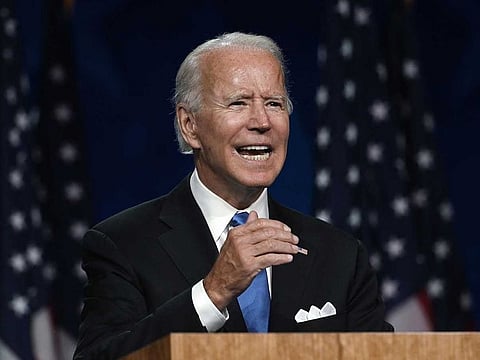This is what works for Democrats in the US
In recent midterms it was voters, not leaders, that drove the party’s strong performance

The heroes of the 2022 midterm elections were Democratic voters and activists, not the party’s leadership. Those leaders should remember that and not try to distance themselves from the party’s base as they have at times in the past two years.
Though they changed course in the final months before the election, the Biden administration and congressional Democrats spent much of 2021 and 2022 on a flawed strategy. Democratic leaders were determined to boost the party with people who didn’t vote for Joe Biden in 2020, particularly the White voters without college degrees who have shifted to the GOP over the past several decades.
So Democrats focused largely on economic policy, such as the American Rescue Plan, the infrastructure bill and a law making it easier to manufacture microchips in the United States. They intentionally highlighted how these provisions would help people without college degrees and people in rural areas.
They at times sidelined other issues, such as voting rights, that might not be the priorities of White voters without college degrees. It’s great that the Democrats are finally moving on from the overly business-friendly, neoliberal economic policies they embraced from the early 1980s through the 2010s and helped lead to massive inequality and decimation of small towns across the Midwest.
The party’s new economic populism will help all Americans, not just White voters without degrees. And in the long term, I think this agenda will help the party electorally, by making clear to voters that Democrats are the party that most represents the interests of average Americans.
It’s morally good and potentially politically useful for Democrats to try to reach Trump voters.
But this strategy wasn’t working — and party leaders stuck to it for far too long. In the short term, the United States needs Democrats to win elections to prevent an increasingly extreme, antidemocratic Republican Party from gaining more power.
And at least right now, the vast majority of White Protestants and White voters without degrees are embracing and in some ways driving the Republican Party’s drift to radicalism. These voters never warmed to Biden, despite his policy agenda aimed at them. Their strong disapproval made Biden more unpopular at times than even Donald Trump was early in his presidency.
Ultimately, White voters without degrees backed the GOP by about a 30-point margin in November’s elections, according to surveys of the election results. And very few people (just 4 per cent, according to exit polls) who voted for Trump in 2020 supported a Democratic congressional candidate in this week’s elections.
Perhaps the Democrats would have done even worse with White voters without degrees if not for their strategies over the past two years. But what drove the Democrats’ surprisingly strong performance in this month’s elections was the backing of groups that the party really hadn’t delivered for or prioritised over the past two years.
Voters under 30 overwhelmingly supported Democratic candidates, even though Biden waited until essentially the last possible moment to follow through on his promise to cancel student loans and did so in a way that basically guaranteed Republican-appointed federal judges would hold it up.
So did Black voters, even as the party’s racial equity, voting rights and police reform policies were stalled by Republican opposition and at times little effort from Democrats. Women favoured the party, even though Roe v. Wade was overturned and the administration’s initial response to the ruling was lacklustre. College graduates favoured Democrats, even as the party took intentional steps to woo non-college voters.
Black voters don’t care only about racial issues of course, nor women only about abortion. And Democrats got millions of votes from people over 30, men, non-Black voters and college voters. But the groups where Democrats won substantially more votes than Republicans were the same ones that lifted the party in 2018 and 2020.
The party’s leadership, particularly Biden, in many ways caught up with the party’s voters and activists in the months right before the election. The president used the term “semi-fascism” to describe the beliefs of some Republicans.
Biden's policy decisions
He gave two strong speeches warning that Republicans were becoming antidemocratic. He promised to push for a national law guaranteeing the right to an abortion if Democrats grew their majorities in the House and Senate. He stopped emphasising how bipartisan he is and started demonising the Republicans as a party that would cut Social Security and Medicare.
Unsurprisingly, none of that seems to have resonated much with White voters without degrees who have voted for Republicans in recent elections. But for the Democratic Party’s core base, it likely reinforced the urgency of voting. Early indications are that this midterm elections will have the second-highest turnout in decades, behind only 2018.
It appears that the people who came out in opposition to Donald Trump in 2018 and 2020 were in full force again this November. Perhaps some of those voters were particularly motivated by the infrastructure bill or the microchips legislation. But I doubt it.
The Democrats didn’t do well in this year’s elections by flipping lots of voters in places that voted Republican in 2020, such as Florida and Ohio. What they did was maintain strength in the congressional districts and states that they won two years ago and four years ago. The party’s base prevented the bottom from falling out.
This year, millions of Democratic-leaning voters turned out and stuck with the party, looking past sky-high inflation and a leadership team that spent much of its time courting people who would never vote for Democrats while ignoring key priorities of people who always vote for the Democrats.
These voters should be commended and celebrated.
Washington Post
Perry Bacon Jr. is a columnist and a political editor for NBC



